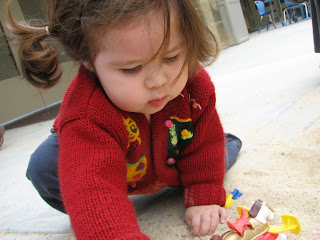
Prompted by Isabel's more enthusiastic response to my dad's prompts for speech when they were directed at someone other than her, I looked up afterwards what I could remember from what he'd said: "parrot rival method".
Pretty sure I'd never typed that before.
I was interested in the "model-rival method" that psychologist
Irene Pepperberg had used with her parrot, Alex, at Brandeis, because I had originally thought that James might have a similar reaction once Isabel started talking. I thought he would be motivated to vocalize when he saw interactions that I had with him generating a different response in his sister, but what really happened was that Isabel became more interested in signing than in vocalizing herself. That is, it worked. On her, not him, and James' system, signing, took precedence. James, contrary to what I thought at first, has never had a problem with motivation. I was astounded when I realized that he signed, and spoke for that matter, before Isabel did. His reasons for barely being able to speak are different from the reasons for Isabel's expressive language delay, and the squawks of the unlearned parrot, and the way he eventually comes to speak will be just as different as the ways they will.
Diane Sherman has had some success using Pepperberg's version of the model-rival method with small groups of children with autism. Autism hasn't much in common with Down syndrome. Still, it would be interesting to apply these principles, consciously this time, having both kids be models and rivals, and see what happens with both.
It turns out Alex was the parrot Kim mentioned to me last week who "knew about zero". I was skeptical, because (it's a character defect, and) it seemed from what I knew about numerical history (I mostly enjoy math when it's historical, or when it's impossible), zero was a pretty late concept in humans. So I'm interested to read about it.
Here is the article. It's not often you can get this kind of thing without a subscription.
I've been interested in counting, too, because of two things. I've been bogged down in the book,
The Psychobiology of Down Syndrome, for, I think, a year now, and the studies on the stages of understanding counting were fascinating. Also, counting was one of Isabel's first interests, and numbers perhaps her first attempts at words. She's gone through a few stages so far: learning a list of vocalizations, knowing that, aside from a vocal performance, counting is something we do as we pick up one object at a time, and the dawning knowledge that sometimes we count backwards, and
why do we do that?! She sometimes furrows her brow at this, and sometimes smiles delightedly, but never, never participates in it. She also never counts past eleven outside of her immediate family, and never past fourteen no matter who's listening. Anything beyond that, to judge by her laughter when I suggest fifteen, is just ridiculous.
